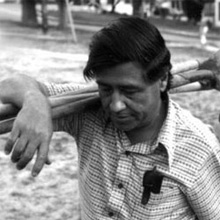Cesar Chavez's Lasting Legacy
 Francisco Zermeo - The Daily Review Francisco Zermeo - The Daily Review


| | In memory of Cesar Chavez: March 31, 1927 - April 23, 1993 (Photo: AP) |
On my drive back from Tijuana last week, I couldn't help but notice the field workers tilling the fields. They were picking asparagus, strawberries, citrus and quite a few other goodies destined for our dining table.

I used to be one of them, back in Salinas, during my first summers here. My uncle Jesse used to take me with him. Either it was to pick something pickable, or it was that fantasy of all field workers, the de-weeding of lettuce and other young vegetables.

In those days, we used the hoe: that small, backbreaking garden tool despised by all. My uncle and his buddies, being normal in Mexican height, seemed to have no problem. I, on the other hand, at some 6 feet, had a most difficult time, since I had to bend over a lot more.

All this came to mind because today is the 78th birthday of Cesar E. Chavez. Unfortunately for me, albeit fortunately for my uncle and his buddies, by the time the long hoe was introduced by him, I had already opted to make a living with my head rather than with my back.

I like Cesar because he wasn't narrow-minded. Sure, his main thrust was the plight of the farm workers. However, he also fought just as hard for unionism in the work force, world peace, nonviolence, civil rights, justice, equality, solidarity and education for our youth, all of our youth, especially the migrant children who really have few opportunities to properly finish school.

Keys to his greatness, his model for us to follow, were his proactivity and inclusiveness and, just as exemplary, his can-do attitude.

His was a relentless push, and it landed him in jail, in 1970 for two weeks, in Salinas, for leading a boycott against a grower there. The jail is a mere five blocks from where we used to live, but, alas, by that time, we were living in Oxnard.

He so abhorred violence that he willingly put his life on the line for his cause, by fasting. He did so on three different occasions. He was asked why. His response: "Farm workers everywhere are angry and worried that we cannot win without violence. We have proved it before through persistence, hard work, faith and willingness to sacrifice. We can win and keep our own self-respect and build a great union that will secure the spirit of all people if we do it through a rededication and recommitment to the struggle for justice through nonviolence."

Finally, when the UFW (United Farm Workers Union) won contracts for Cesar and his followers, Cesar E. Chavez officially ended the United Farm Workers' boycott oftable grapes, lettuce and wine, on Jan. 31, 1978.

His message is still being heard. Last week, the almond workers near Sacramento marched, signaling their intention to unionize themselves at the Blue Diamond Growers. Other unions marched alongside them in solidarity.

Here in Hayward, we remember and honor Chavez with a school named after him. La Alianza de Hayward was successful, too, in having our library dedicated in his honor in 1994. At Chabot College, where Chavez made a stop in 1975, the Chicano Latino Education Association succeeded in convincing our Board of Trustees to name the plaza where he spoke the Cesar E. Chavez Plaza.

At that time he spoke of the success of the wine, grape and lettuce boycotts and asked for continued support for the cause of the farm workers.

If you are interested in improving our community, one way to do this is to look for ways to maximize our potential as human beings. You may also visit the Cesar E. Chavez foundation, whose motto is "educate, celebrate, serve."

We still have a lot to do, however. Ernie Avellar, a Daily Review and Zermeo column reader, sent me an interesting article about the efforts being made by Sen. Barbara Boxer, all with the objective of honoring one of our real American heroes.

Being worked on at the moment is The Agricultural Job Opportunities, Benefits, and Security Act of 2005, geared to adjust the status of certain foreign agricultural workers; amend the Immigration and Nationality Act to reform the H-2A worker program; provide a stable, legal agricultural work force; and extend basic legal protections and better condition to more workers.

There is also The Fair Wage, Competition and Investment Act of 2005 to provide fair wages for America's workers, create new jobs through investment in America, and provide for fair trade and competition.

Finally, The Next Generation Hispanic-Serving Institutions Act to provide first-time support for graduate education at Hispanic-Serving Institutions (HSIs); provide new program support for two-year HSIs; and authorize $125 million in new spending on graduate education enhancements at HSIs beginning in federal fiscal year 2006.

Thank you, Cesar E. Chavez, for the good lessons you left us. "Si se puede!" We all can. Hayward on! |



